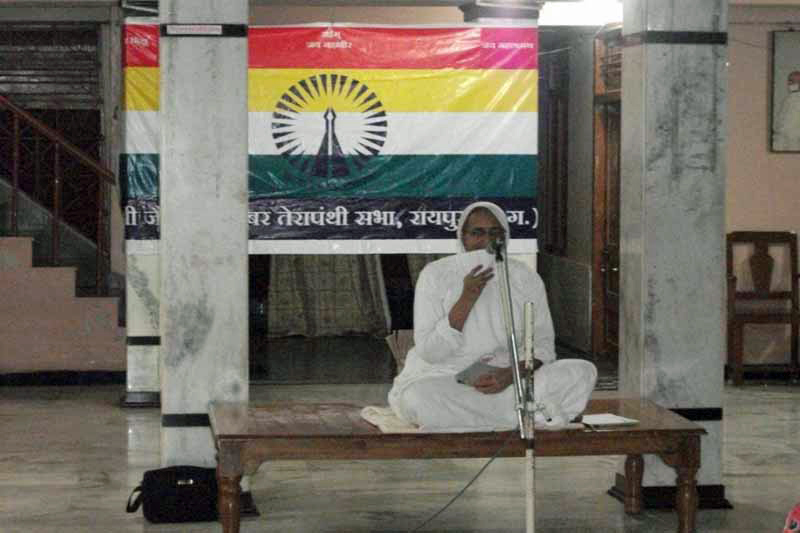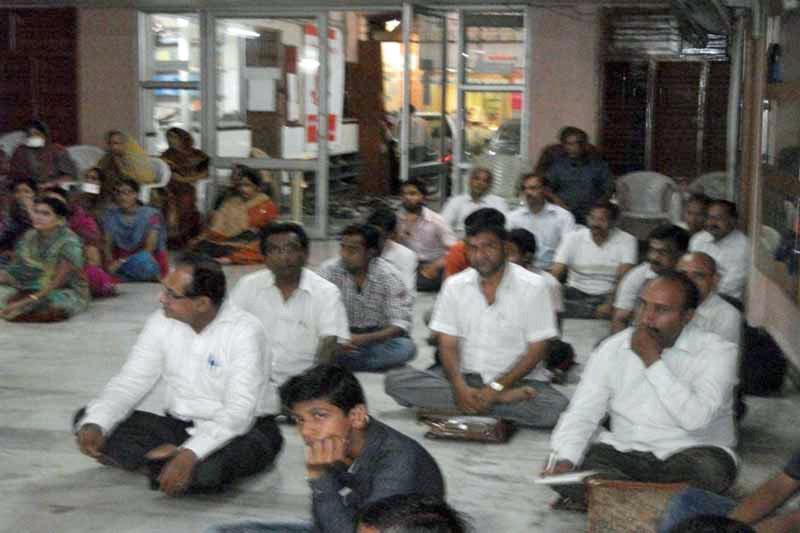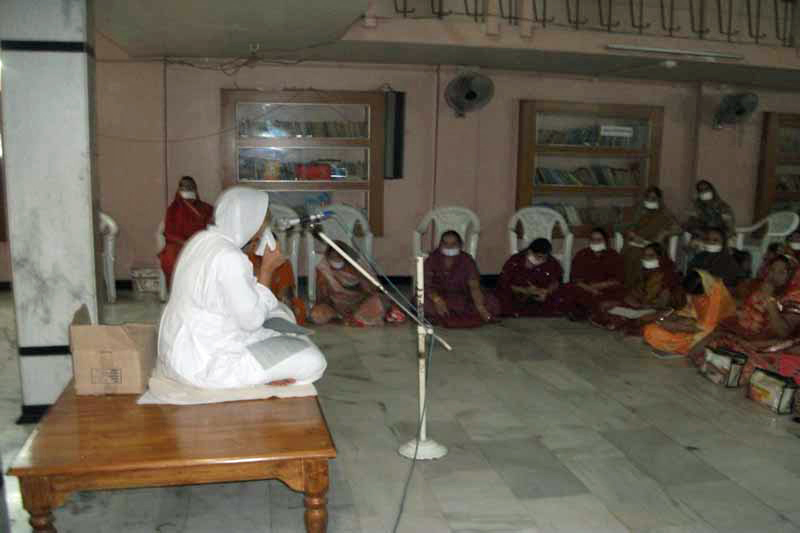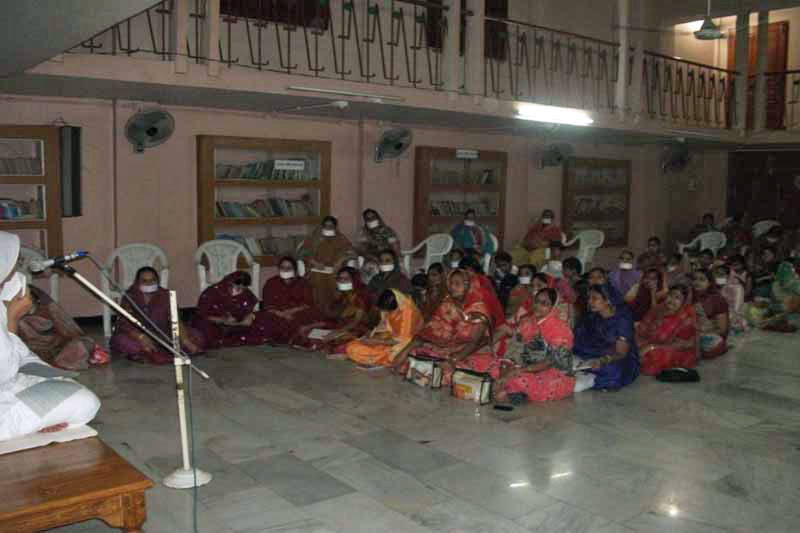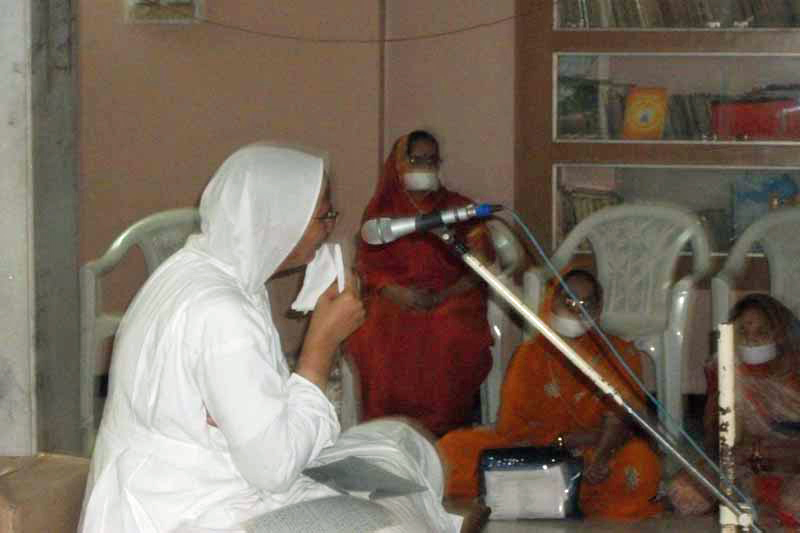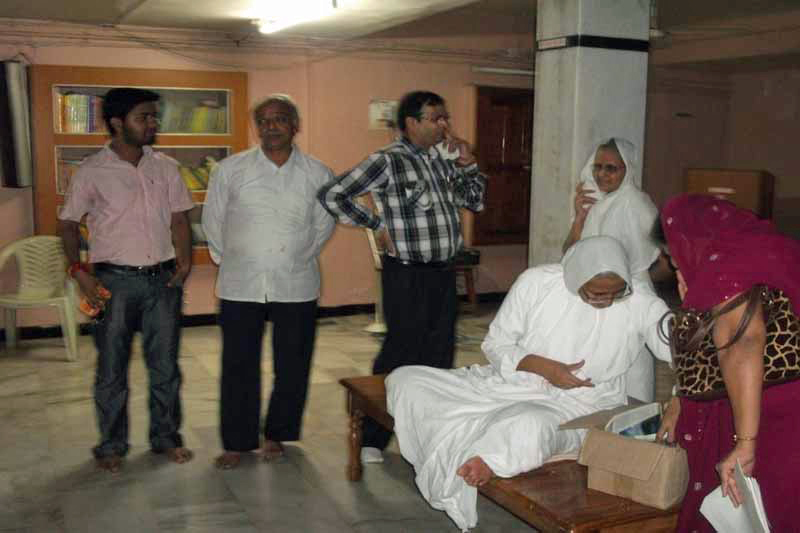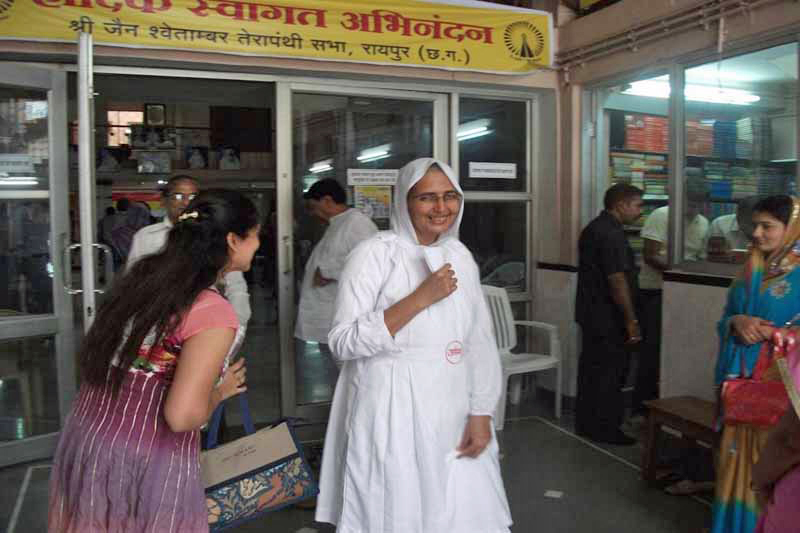Day 1 - Food Restraint Day
Day First of Paryushan 2011 programme was celebrated as 'Khad Sanyam Diwas in presence of Samani Jinpragya at Amolak Bhawan, Raipur, Chhattisgarh. Samani Jinpragya spoke in detail about the 'Food Restraint Day’. She said a food restraint provides the right vitamins minerals and nutrients to keep the body and mind strong and healthy. Eating well can also aid in the prevention of a variety of diseases and health problems, as well as helping to maintain a healthy body weight, providing energy and promoting a general feeling of well-being. A balanced food is very important to the immune system, helping to ensure that the vitamins, minerals, and other nutrients necessary to its efficient function are available. Even minimal deficiencies in certain nutrients can impair immune system function, such as vitamin A, B-vitamins, vitamin C, vitamin E, Zinc, iron and selenium. According to the American Heart Association, a healthy diet and lifestyle are the best weapons against cardiovascular disease. One of the most noticeable benefits of a food restraint is energy. Keeping your body fueled with the right proportions of vitamins, minerals and nutrients can give you the energy you need to make the most of your day. Your food restraint can reduce your risk of illnesses such as heart disease, cancer, and diabetes, as well as defend against depression. Additionally, learning the habits of food restraint can boost your energy and sharpen your memory. Sugar causes energy ups and downs and can add to health and weight problems. Eating too much salt can cause high blood pressure and lead to other health problems. People often stuff food into their mouths at an unbelievable rate when they are under stress. Stuff huge amounts of food onto your fork and you'll end up failing to chew your food properly. Chewing is an essential part of the digestive process and the saliva in your mouth contains enzymes which help prepare your food for the secretions produced by the stomach. Don't try eating while you're reading or watching television.
Day 2 - Swadhyay Diwas
Second day of Paryushan 2011 programme held at Amolak Bhawan, Sadar Bazar, Raipur, Chhattisgarh in pious presense of Samani Jinpragyaji. Samani Jinpragyaji said that Unlike TV, swadhyay make you to use your brain. By swadhyay, you think more and become smarter. Swadhyay takes brain power. It requires you to focus on what you are reading for long periods. Since you must concentrate in order to read, like a muscle, you will get better at concentration. Many studies show if you don’t use your memory, you lose it. Swadhyay improves your discipline. Books are portable. You can take them almost anywhere. Swadhyay improves creativity by reading more books and exposing yourself to new and more complete information, you will also be able to come up with more creative ideas. Swadhyay improves your reasoning skills. Swadhyay decreases mistakes. Swadhyay has always been the favorite hobby of many. It is true that books are our best friends for they love us unconditionally. As far as learning is concerned, there is nothing better than swadhyay that can help us do that. Hence, it is swadhyay which influences many and not the television. Spirituality is on the rise due to the transforming times. People wish to lead happier lives and hence resort to spirituality in the deal. There isn’t anything wrong in following the so called path of spirituality as it only helps us to know what life means or what our role is in today’s world, etc. Therefore, if you really wish to relax yourself there could be nothing more soothing than swadhyay. So trust the fact that your time invested in swadhyay will definitely lend you a newer life ahead. We derive following from swadhyay:
- Reading reduces stress
When we do swadhyay, our mind shifts gears. Where we might have a stressful day, the swadhyay can easily distract us. - Greater tranquility
Swadhyay can soothe like no other. - Improved analytical thinking
Swadhyay improved analytical thinking. - Improved memory
Swadhyay improved memory power.
Day 3 - Samayik Diwas
Day three of Paryushan 2011 programme was celebrated as 'Samayik Diwas' in presence of Samani Jinpragya at Amolak Bhawan, Raipur, Chhattisgarh. Samani Jinpragya spoke in detail about the 'Samayik’. Before starting your Samayik finish all your other worldly chores, so that your mind does not get involved in those thoughts. This includes all the physiological as well as socio-economic matters. During Samayik we concentrate our minds. So we keep our thoughts and body steady, without movement. There are different kind of mistakes that we should avoid, as listed in our scriptures, for mind, speech, and body.The mental lapses to avoid are: Doing Samayik without respect to Dev, Guru and Dharma, or for fame and prestige, or out of desire for wealth, or with fear or pride, or for other material reward, or with doubt, anger, or impertinence, or under compulsion, without the willingness to do it.
The verbal lapses to avoid are: Speaking bad words or speaking without thinking, or talking or singing songs which raise uncontrollable emotions, or indulging in quarrelsome language, gossips, mocking language, irrationality, or in doubtful (mixed) speech, or uttering incomplete words or letters, or uttering speedily without clarity.
The physical lapses avoid are: Sitting uncourteously with crossed legs or with one leg over another, or with unsteady posture, or with unsteady eye-sight, or by leaning against something, or with hand on the head or forehead or in a sorrowful posture, or doing domestic work, or stretching body, hands, or legs lazily, or drowsily, or making sound by cracking knuckles, or scratching dirt from body or rubbing itching parts, or sleeping.By doing Samayik without these mistakes, and doing it with correct procedure, we get immense and incalculable benefits.
Benefits of SAMAYIK VARTA
- It gives us peace of mind.
- It helps in concentration of mind.
- It makes our impure soul free from Karma dust.
- It brings under control mind, speech and body.
- It leads the soul to infinite and endless happiness of Moksha.
DAY 4 - SPEECH RESTRAINT DAY
Day four of Paryushan 2011 programme was celebrated as 'SPEECH RESTRAIN DAY' in presence of Samani Jinpragya at Amolak Bhawan, Raipur, Chhattisgarh. Samani Jinpragya spoke in detail about the 'Speech Restrain Day ’. Addressing the gathering Samani Jinpragya ji said in silence, we can hear our soul speak. Getting in touch with our inner self is truly the way to attain joy and contentment. A silent mind, freed from the constant onslaught of thoughts and thought processes, is vital for personal as well as spiritual development. Many religions profess that inner silence can bring us in contact with the divine or the ultimate reality. But in reality, silence is one of our greatest friends and if practiced well can have a wonderful effect on us.Silence is Creative Silence allows you to trust yourself. You give yourself time to listen to your inner voice. You learn to discover your unique ways of knowing. You discover that you do know the answers. Entering your inner silence gives you deep rest. Silence is not just something we experience on the outside. It is equally, if not more important, to learn art of silence that is internal. Given times of stress and upheaval we can then retreat to our silent place of safety. Silence allows listening. Most people in our world long to be truly heard. This allows listening and real communication. Silence moves us toward real communion. Gift yourself a rest of silence each day. This will develop a greater sense of well being in all aspects of your busy life. You can be centred and still while everyone else rushes around. Silence has been used as an anchor in the lives of all those who find it truly is a wonderful life.
DAY 5 - ANUVART CHETNA DIWAS
Day five of Paryushan 2011 programme was celebrated as 'Anuvart Chetna Diwas' in presence of Samani Jinpragya at Amolak Bhawan, Raipur, Chhattisgarh. Samani Jinpragya spoke in detail about the 'Anuvart Chetna Diwas ’. Addressing the gathering Samani Jinpragya ji said Acharya Shri Tulsi propagated the Anuvart for upliftment of moral values in the people. When we speak of values in character-building, it is primarily as moral beliefs or principles. They are convictions that guide our actions by determining what is right and what is wrong, what is desirable and what is undesirable. Moral strength helps an individual to manifest love, selflessness, peace and happiness. The same moral force begets in society values like liberty, fraternity, non-violence and justice. The small vows called Anuvart have been prescribed for each and every class for upliftment of moral values. These small vows can be accepted by anyone to practice contentment and which as a result purified the soul.
DAY 6- JAAP DIWAS
Day six of Paryushan 2011 programme was celebrated as 'JAAP DIWAS' in presence of Samani Jinpragya at Amolak Bhawan, Raipur, Chhattisgarh. Samani Jinpragya spoke in detail about the 'Jaap ’.She said chanting of mantra regulates the chronic stress and tension that is the norm for many people in today’s hyper-stimulated lifestyle. And by balancing the endocrine system, chanting normalizes hormone production, which balances our moods and overall sense of well-being. We begin to identify with the timelessness of the soul and consequently begin to shed neurotic habits that no longer serve and that no longer seem relevant. It relieves us from the sights and sounds and stimulation of the material world and delivers us into a spiritual space. Chanting of mantra boosts immunity and compassion. Our thoughts reflect and affect our mood, our attitude and our general tenor. Our thoughts are silent sounds. And sounds are electromagnetic vibrations. The more refined our thoughts, the more elevated our vibration; the more elevated our vibration, the closer we get to the highest vibration of all–our own divine nature.
DAY7 - DHYAN DIWAS
Day seven of Paryushan 2011 programme was celebrated as 'DHYAN DIWAS' (MEDITATION DAY) in presence of Samani Jinpragya at Amolak Bhawan, Raipur, Chhattisgarh. Samani Jinpragya spoke in detail about the 'Meditation’.
She said Prekshya Dhyan is finest methods for overcoming stress. Practice of dhyan will help people to handle their everyday stress. Meditation nonetheless may help calm the mind. It’s been proven to permit the mind, body and soul to realize tranquility and balance. Meditation was also proven to be effective in increasing somebody’s creativity and focus, that’s essential for performing each day activities. Meditation also helps the body to achieve absolute relaxation. This activity has also been proven to be ideal for those that are recovering from illnesses, surgeries or traumas. Meditation also helps in improving concentration. Meditation is believed improve body luster and general health. When your mind focuses on a particular part of the body the blood flow to that part increases and cells receive more oxygen and other nutrients in abundance. It allow better blood circulation and help people to take in nutrients from food better and distribute these nutrients to the whole.
DAY 8 - SAMVATSARI MAHAPARVA
The last day of the eight days religious worship - “Paryushan Mahaparva” is known as Samvatsari Mahaparva, that is the Great Annual Festival. Millions of people observe a fast on this day.
Hundreds of men & women from Raipur and adjoining area came for celebrating the Samvatsari Festival under the pious presence and guidance of Samani Nidesika Jinpragyaji. The Programme started well before the sunrise with lay followers coming in for their daynight long Poushadhbrata.
Samani Jinpragya said that, the Samvatsari is a festival of “Atma-Sadhna”. She said that Jain Philosophy views Tapa as nirjara means the eradication of karmas. Tapa is generally known as fasting in which food & drink has not been taken except the water.
Hundreds of people had observered the fast & nearly 100 men & women has done the posadh (adopting saint life for one day).
On this auspicious occasion of Paryushan we beg forgiveness for our intentional and unintentional wrong doing. One custom followed after the last day of Paryushan (Samvatsari) is that of saying "Michhami Dukkadam". On Samvatsari day the ritual of "Pratikraman" is performed. Since "Samvatsari" is an annual event so is the Samvatsari Pratikraman. Under Samvatsari Pratikraman there comes the retrospection of all bad deeds and mistakes committed in the past year. We are critical of the bad deeds and resolve not to let them happen in the future. We also request forgiveness from all the living beings in the world if we might have knowingly or unknowingly caused harm to them. Thus, after the Pratikraman it is customary to request forgiveness from everyone we know and meet by saying "Michhami Dukkadam". The idea behind it being that - "After requesting forgiveness from all living beings in general as part of Pratikraman, I do so one-to-one with you." We become more specific and personal by doing so. In addition to requesting forgiveness, one has to grant forgiveness too. Thus by forgiving everyone and requesting forgiveness from all we ligthen ourselves and our mind from past year's misdeeds. "Michchhami (Mithya) means fruitless/forgiven and Dukkadam (Dushkrit) means bad deeds. Therefore the meaning of Michchhami Dukkadam is'My bad deeds be fruitless'. So the idea behind conveying Michchhami Dukkadam is that if I have caused any harm to you then may those bad deeds be forgiven, become fruitless.
"KHAMEMI SAVVE JIVA:
I forgive all the living beings
SAVVE JIVA KHAMANTU:
ME I seek pardon from all the living beings
MITTI ME SAVVA BHUTESU:
I am friendly towards all the living beings
VERAM MAJJHAM NA KENVI:
And seek enmity with none.
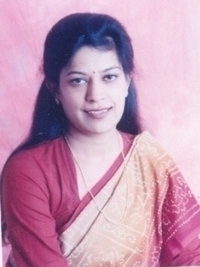 Ritu S. Jain
Ritu S. Jain
